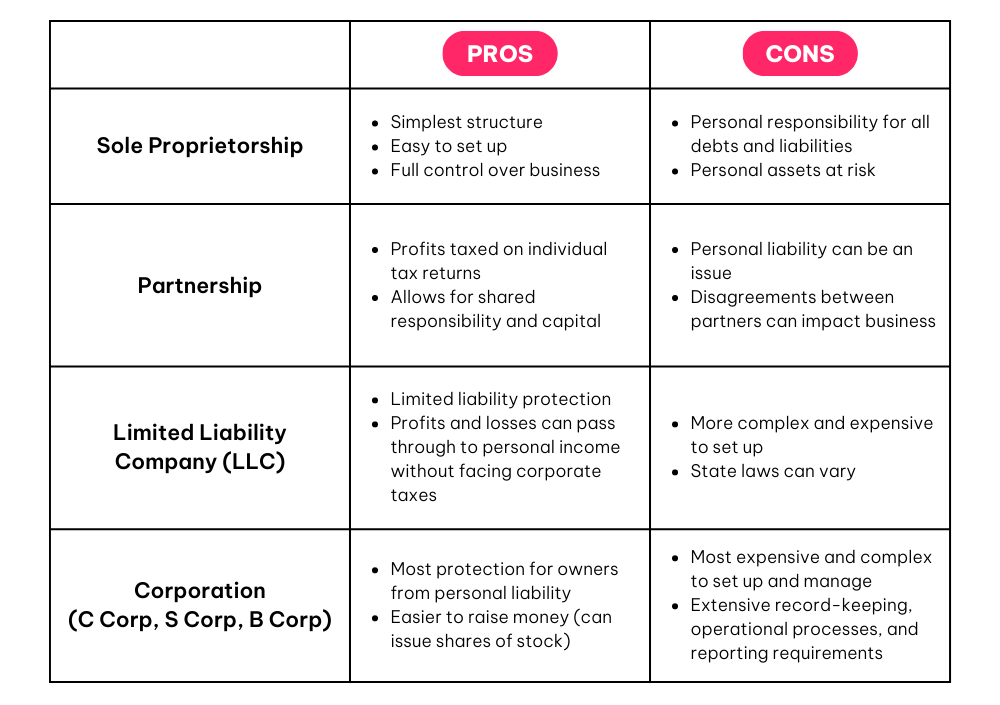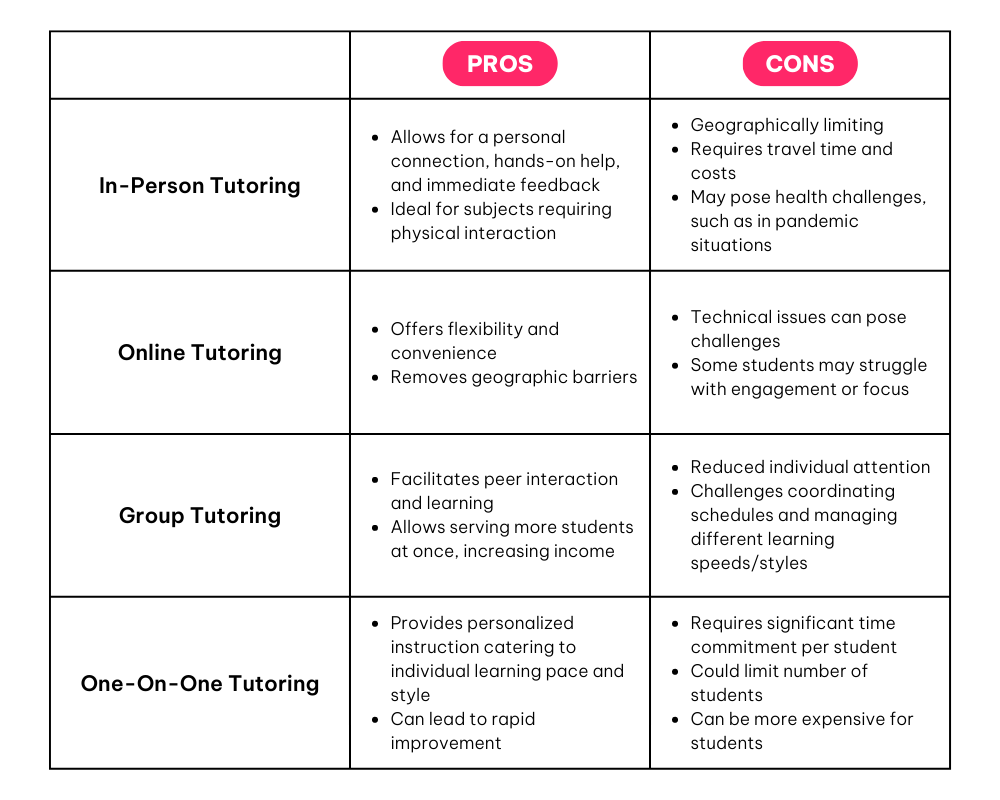Step-by-Step: How to Start a Tutoring Business and Thrive

Starting your own tutoring business can be a rewarding journey, opening up a world of possibilities for you and the countless students you'll help along the way.
So, you've found yourself here, asking the big question: "How do I start a tutoring business?" Well, friend, you've come to the right place!
We've curated this comprehensive guide that will walk you through the process, step by step, from finding your niche in the crowded educational world to mastering the art of teaching that keeps your students coming back for more.
And hey, before you start stressing over all the 'business-y' stuff – like legal requirements, pricing, and marketing – let us assure you: we've got you covered there, too.
By the end of this guide, you'll have a clear blueprint for your tutoring business and, more importantly, the confidence to make it a reality. So grab a cup of coffee, settle in, and let's dive into this exciting journey together.
Here’s what we’ll cover:
Recognizing Your Tutoring Talent
Uncover your subject expertise, teaching style, and the student level you're most suited to teach.Meeting the Educational Standards
Understand the necessary qualifications and certifications to stand out in the tutoring industry.Finding the Right Business Structure
Explore different business structures—sole proprietorship, LLC, etc.—to find the right fit for your tutoring enterprise.6 Steps for Creating a Comprehensive Business Plan
Learn how to craft an effective business plan that guides your tutoring business towards success.Going Official: Registering Your Business
Navigate the process of officially registering your business in your region.Setting Up Your Ideal Workspace
Whether in-person or online, establish a workspace conducive to effective learning.Building Your Educational Arsenal
Develop engaging and effective curriculum resources that cater to the diverse needs of your students.Establishing Your Pricing Structure
Formulate a competitive yet fair pricing structure for your tutoring services.Marketing Your Tutoring Business
Discover effective marketing strategies to make your tutoring business known.6 Ways to Cultivate Your Student Community
Foster relationships with your students and expand your tutoring community.Managing Your Business Finances
Keep your business financially healthy with effective money management strategies.Evaluating and Scaling Your Tutoring Business
Continually assess and grow your business to ensure sustained success.
Recognizing Your Tutoring Talent
Before starting your tutoring business, take these essential steps to assess your unique skills and experience:
Identify Your Subject Strengths: From calculus to Shakespearean prose to physics, pinpoint your academic strengths to find your tutoring focus.
Determine Your Teaching Level: Whether you're equipped to teach elementary, high school, or college-level students, be clear about where your skills and patience align best.
Understand Your Tutoring Style: Are you a hands-on teacher or a guide for self-discovery? Do you thrive in one-on-one sessions or group settings? Your style will shape the services you offer.
Evaluate Your Previous Experience: Have you tutored before or taught in a classroom? Do you hold any relevant certifications? These factors add credibility and give you a competitive edge in the market.
Remember, your skills and experience form the foundation of your tutoring business. By carefully assessing what you can offer, you'll be well-prepared for the exciting journey ahead.
Meeting the Educational Standards
As you prepare to launch your tutoring business, you must also understand the qualifications and certifications that could set you apart in the industry.
Here's a simple guide to help you evaluate your credentials:
Formal Education: While not always necessary, a degree in the subject you wish to tutor can enhance your credibility and appeal to potential clients.
Tutoring Certifications: There are numerous online and offline tutoring certification programs. While not mandatory, these certifications can demonstrate your commitment and professional aptitude.
Teaching License: This is a significant advantage. This license attests to your formal training and can be a major selling point for parents and students.
Special Education Certification: If you plan to work with students with special needs, having a special education certification can be a huge benefit. It assures parents of your competence in this specialized area.
Subject-Specific Certifications: Certain fields, like foreign languages or standardized test preparation, may have specific certifications. Acquiring these credentials can further prove your proficiency.
While qualifications and certifications can be vital, remember that your ability to connect with students and help them succeed is just as, if not more, important. Still, these credentials can boost your confidence, enhance your professional reputation, and open more opportunities for your tutoring business.
Finding the Right Business Structure
Deciding on a business structure is one of the most important choices when starting your tutoring business. Each structure has its own set of legal, tax, and operational implications.
Here's an overview of some common structures:

This SBA guide provides more information about each structure to help you make an informed decision. It's crucial to consider your business goals, risk tolerance, and potential for growth before deciding.
You may also want to consult with a business advisor or attorney to fully understand each structure's legal and tax implications.
6 Steps for Creating a Comprehensive Business Plan
Launching your tutoring business starts with a strong plan. Your business plan is a roadmap to guide your decisions and a valuable tool for attracting potential investors or partners.
Here's a step-by-step guide to creating your business plan, complemented by helpful tools and resources:
Executive Summary:
This is a snapshot of your business. It should include your business name, services, and your mission statement. Aim to encapsulate what sets your tutoring business apart.Market Analysis:
Identify your target market and understand the competitive landscape. Define the age group and academic level you will cater to, and evaluate the presence of other tutors or tutoring companies in your area.Organization and Services:
Detail your services, including subjects and levels taught. Also, outline your business structure - will you work alone or hire other tutors? Will your services be online, face-to-face, or both?Marketing and Sales Strategy:
Determine how you will attract and retain clients. Will you advertise, use social media, or rely on networking? Reflect on your unique selling points and how to communicate them.Financial Projections:
Estimate your initial costs and expected income. Consider your break-even point and what it will take to become profitable.Legal Considerations:
Research any legal requirements or regulations you need to follow, including business registration, zoning laws for home-based businesses, and data protection for student records.
When it comes to drafting your plan, there are plenty of resources available:
U.S. Small Business Administration (SBA) Business Plan Guide provides a comprehensive guide.
Bplans offers over 500 free sample business plans from various industries.
SCORE provides business plan templates, webinars, and one-on-one mentoring.
Consider paid services like LivePlan for a guided process.
For a more visual plan, Canva's Business Plan Templates are customizable.
Remember, while these resources can provide a great starting point, your business plan should reflect your unique vision and strategy for your tutoring business.
Going Official: Registering Your Business
Officially establishing your tutoring business is a significant step towards professionalism and legality. Here's a guide to help you register your business, supplemented by helpful online resources:
Choose Your Business Name: This name will represent your tutoring services to the world. Ensure it's unique, memorable, and reflective of your services.
Check Name Availability: Before committing to a name, check it's not already in use. This can usually be done through an online search on your local Secretary of State's website. In the U.S., you can use the U.S. Patent and Trademark Office's trademark search tool to check for federal trademarks.
Decide on a Business Structure: Are you a sole proprietor, or will you create a partnership, a Limited Liability Company (LLC), or a corporation? Each structure has different legal and tax considerations.
Register Your Business: Depending on your location and business structure, you might need to register your business with federal, state, and/or local authorities. This SBA guide provides comprehensive information on how to proceed.
Apply for an Employer Identification Number (EIN): If you're based in the U.S. and plan on hiring employees, you'll need an EIN from the IRS. An EIN is useful for opening a business bank account even without employees. You can apply for one directly on the IRS website.
Obtain Necessary Permits and Licenses: Depending on your location and the nature of your tutoring services, you might need specific permits or licenses to operate legally. The SBA's guide to business licenses and permits can point you in the right direction.
Remember, the process of registering your business can vary greatly depending on your location, so always consult local and state laws and consider seeking advice from a legal professional. This will ensure you meet all necessary legal requirements, allowing you to focus on what you do best: helping students succeed.
Setting Up Your Ideal Workspace
When establishing your tutoring business, deciding on your mode of delivery is crucial. Each business model—be it in-person, online, group, or one-on-one—comes with its unique benefits and shortcomings.
Let's break them down:

Remember, you don't have to confine yourself to one single model. A mixed-methods approach could give you the versatility to cater to a broader range of student needs.
Incorporating asynchronous communication in your online and group coaching models can offer significant benefits—it allows students to pose questions or discussions at any time and enables you to respond thoughtfully at your convenience.
Moreover, asynchronous communication can help resolve scheduling conflicts by allowing interactions that don't rely on everyone being available simultaneously!
Always be attuned to your clients' feedback and be willing to adapt your business model to deliver the most effective tutoring services.
Building Your Educational Arsenal
Creating a comprehensive curriculum and diverse resources is at the heart of any successful tutoring business. This helps ensure your students learn effectively, master their subjects, and accomplish their academic goals.
Here are some tips to guide you:
Identify Key Learning Objectives: Clearly outline what you want your students to learn and be able to do at the end of each session or course.
Create Lesson Plans: Develop structured lesson plans that deliver the learning objectives. Ensure your plans include various activities catering to different learning styles.
Use Various Learning Materials: Besides textbooks, incorporate videos, podcasts, quizzes, interactive games, and more to make learning engaging.
Design Assessments: Regular assessments are crucial to gauge a student's progress and understanding. Include quizzes, practice problems, and mock exams in your curriculum.
Update and Improve: As you gain experience and receive student feedback, make necessary improvements and adjustments to your curriculum.
One tool that can significantly aid in this process is Clarityflow. Clarityflow enables you to build a digital library of resources and courses stored as videos, modules, frameworks, assessments, and more. This not only makes your curriculum easily accessible to students but also allows for straightforward updates and improvements over time.
Remember, a strong curriculum and a rich set of resources can differentiate your tutoring business in a competitive market. It's worth investing the time and energy to get it right.
Establishing Your Pricing Structure
Defining your pricing structure is crucial to setting up your tutoring business. You want to ensure that your prices are competitive yet sustainable and profitable.
Here are some key considerations:
Understand Your Costs: Evaluate direct costs, like materials or software subscriptions, and indirect costs, such as marketing or administration. Understanding these will give you a baseline for your pricing.
Research the Market: Research what other tutors in your area or subject specialism charge. This gives you a sense of the going rate and helps you position your services competitively.
Consider Your Experience and Qualifications: Tutors with higher qualifications or more experience often charge more. Don't undersell your services if you've invested in your education or have a track record of success.
Factor in Your Business Model: If you're offering one-on-one tutoring, you might charge more than if you're tutoring groups. Similarly, specialized or advanced-level tutoring might warrant higher fees.
Think About Value-Based Pricing: Instead of simply charging by the hour, consider the value you're providing. If your tutoring significantly improves grades or helps students master difficult subjects, your price should reflect that.
Be Transparent: Once you've established your pricing, be clear and upfront with your clients to avoid any confusion or surprises later on.
Remember, while it's important to ensure your services are affordable for your target market, your prices should reflect the value and quality of your tutoring. You're providing a vital service, and your pricing should respect the time, effort, and expertise you bring to the table.
Marketing Your Tutoring Business
Now that you've laid the groundwork for your tutoring business, it's time to get the word out. A strategic marketing plan will help you attract clients and grow your business. Here are some key strategies to consider:
Create a Professional Website and Social Media Presence
Your website is your online storefront; make it informative, easy to navigate, and appealing. Social media platforms like Facebook, Instagram, and LinkedIn can help you connect with your audience, showcase your expertise, and build a community. You might also consider starting a blog with useful tips and insights to position yourself as a thought leader in your field.
Develop Promotional Materials
Invest in professional business cards and flyers to distribute at local schools, libraries, community centers, and other places where potential clients might gather. These materials should reflect your brand and clearly communicate your services and contact information.
Utilize Online Platforms and Directories
List your services on tutoring directories, local business listings, and online platforms such as Google My Business. This increases your online visibility and makes finding you easier for potential clients.
Engage in Local Community Events and Partnerships
Participate in school events, educational fairs, and local community activities to raise awareness of your services. Consider partnering with schools, libraries, or other local businesses to broaden your network and reach.
Encourage Word-of-Mouth Marketing and Referrals
Happy clients are your best advocates. Encourage satisfied students and parents to refer your services to others. Consider offering a referral discount or reward to incentivize this.
Remember, marketing is an ongoing process. Regularly evaluate your strategies, track their effectiveness, and adjust as needed. Over time, you'll find what works best for your tutoring business and be well on your way to establishing a strong client base.
6 Ways to Cultivate Your Student Community
Once your tutoring business is up and running, your next challenge is attracting and retaining clients.
Here are 6 ways you can start building a solid client base:
Understand Your Target Market: Knowing your ideal student is the first step to successful marketing. Understand their needs, their academic struggles, and where they spend their time, both online and offline.
Offer a Free or Discounted First Session: This gives potential clients a risk-free opportunity to experience your services. If they find value in your tutoring, they'll be more likely to commit to more sessions.
Ask for Referrals: Word-of-mouth referrals are often the most effective marketing method. Encourage satisfied clients to spread the word about your services. Offering a referral incentive, like a discount on their next session, can help motivate them.
Network: Build relationships with teachers, school administrators, and other tutors. They might refer students to you or offer valuable advice to help you grow your business.
Deliver Excellent Service: The best way to retain clients and attract new ones is by being an exceptional tutor. Help your students achieve their academic goals, and they'll keep coming back.
Follow Up: After a session, reach out to students or parents to see how things went. This shows that you care about your students' progress and helps build strong relationships.
Remember, building a client base takes time, but you'll steadily attract and retain clients by offering top-notch service and being proactive in your marketing. Your tutoring business will grow as a result.
Managing Your Business Finances
Effectively managing your business finances is crucial for your tutoring business's sustainability and growth. Here's a roadmap to keeping your finances in check:
Open a Business Bank Account: Start by separating your personal and business finances. Most major banks offer business accounts - check out this comparison guide from NerdWallet to find one that suits your needs.
Track Income and Expenses: Use accounting software like QuickBooks, Zoho Books, or FreshBooks to record all your business transactions, track your cash flow, and manage invoices.
Set a Budget: Utilize budgeting tools to plan your finances, control your expenses, and ensure your income covers your costs.
Plan for Taxes: Depending on your business structure, you'll have tax obligations. Resources like the IRS Small Business and Self-Employed Tax Center can provide valuable information, but consider working with a tax professional for personalized advice.
Save for Emergencies: Set aside a portion of your income for an emergency fund. Online savings accounts, like those offered by Ally Bank or Marcus by Goldman Sachs, can help you save while earning interest.
Review Financial Performance: Use your accounting software's reporting features to regularly review your income, expenses, and profit margins. This will give you insight into your business's financial health and help identify areas for improvement.
Remember, if finance isn't your forte, hiring a professional is perfectly fine. A bookkeeper or accountant can help manage your finances, freeing you to focus on providing excellent tutoring services.
Evaluating and Scaling Your Tutoring Business
After establishing your tutoring business and gaining some traction, it's important to continually evaluate your operations and consider strategies for growth. Here's how to do that:
Measure Your Success
Use key performance indicators (KPIs) such as the number of students, session completion rates, and customer satisfaction scores to gauge your progress.
Tools like Google Analytics can provide insights on your website's performance, while client feedback can offer invaluable information about your services' effectiveness.
Solicit Feedback
Regularly ask for feedback from your clients. Use online survey tools like SurveyMonkey or Google Forms to make this process easy and organized.
Adjust Your Business Plan
Make necessary adjustments to your business plan based on your evaluations. This could mean refining your marketing strategies, updating your pricing, or adding new services.
Explore Growth Opportunities
Look for opportunities to scale your business. This could involve hiring other tutors, offering new subjects, or expanding into different markets (such as online tutoring if you only offer in-person sessions).
Invest in Professional Development
To maintain a competitive edge, continually hone your skills and knowledge. Participate in professional development courses or workshops.
Websites like Coursera or LinkedIn Learning offer a plethora of online courses across various subjects.
Consider Partnerships
Collaborating with schools, learning centers, or other education-related businesses could provide more opportunities for growth and reach.
Remember, success won't come overnight. Stay patient, be persistent, and strive to improve and expand your tutoring services. With time and effort, you'll see your tutoring business flourish.
Navigating Towards Success
In conclusion, launching and running a successful tutoring business is a rewarding venture, but it certainly requires a mix of educational prowess, entrepreneurship, and dedication. You can create a profitable and impactful tutoring business with careful planning, persistent efforts, and continual learning.
But remember, having the right tools is vital for smooth sailing. Give Clarityflow a try to streamline your tutoring business. With its suite of features, from managing resources to handling your scheduling needs, Clarityflow is a powerful partner that supports your business's growth and efficiency. So, don't wait—transform your tutoring journey with Clarityflow today!


